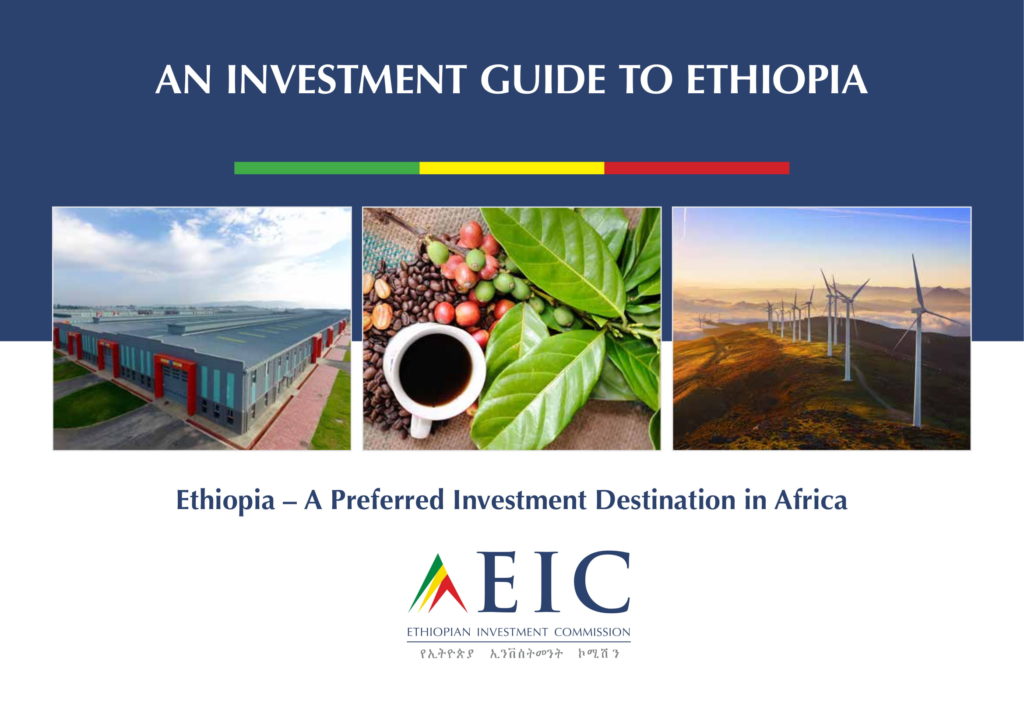

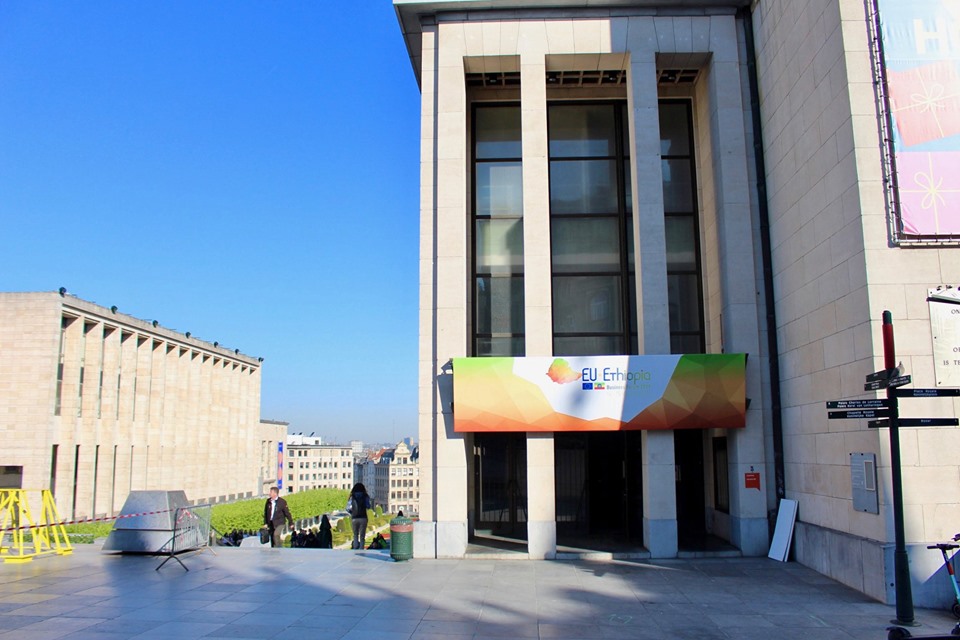
The EU-Ethiopia Business Forum held in Brussels this week had been long in the making. While an EU Business Forum in Ethiopia was established in 2012, it was the first time such an event was organized in Brussels. Its main objective was to stimulate European private sector investment in Ethiopia by providing practical information about doing business in the country.
The Forum took place at a time where Ethiopia’s economic opportunities are attracting considerable interest in the European Union, as proven by the wide and diverse audience that attended the two-day event. During this high-level business forum, investors and businesspeople interested in doing business in Ethiopia learned practical information and were able to interact with top officials from the Ethiopian Investment Commission and other high-ranking officials from Ethiopia.
They also had the occasion to share the experiences of representatives of some of the largest European companies already active in Ethiopia during the panel sessions. Overall, around 200 participants (business companies from all over Europe and Ethiopia, members of the public and private sectors, journalists and EU and Ethiopian officials included) attended the Business Forum.
State Minister for Foreign affairs Dr. Markos Tekle noted that the government was working on new measures to improve doing business in Ethiopia. PM Abiy has set out a steering committee that solely works towards achieving successful results.
Head of the Ethiopian Investment Commission Abebe Abebayehu pointed out that Ethiopia government and agencies would be there every step of the way to support all investors & solve problems should they arise. He also noted that what we have seen in Ethiopia in the past year since Abiy Ahmed has taken over, is a real revolution, since so much has improved.
Mr. Dougie Brew, Corporate Affairs and Sustainable Business Director Africa of Unilever, highlighted the incredible market potential of Ethiopia, especially for local production, as the middle class is growing and consumers need more than just consumer goods. He also said that his industry had the potential to generate 100 indirect jobs for every direct job created.
Mr. Thomas Schaefer, Chairman and Managing Director of Volkswagen Group South Africa, for his part, said that it is the political will and the vision of the government that attracted Volkswagen to Ethiopia. He also encouraged investors to think out of the box. For instance, instead of paying significant amounts for imported oil, they could use Ethiopia’s national gas reserves, which would cut CO2 emissions by 50%.
The Second day of the EU-Ethiopia Business Forum was dedicated to a morning-long networking session. Participants who had registered the previous day were able to discuss in detail potential partnership projects with other interested parties.
Following our discussions with the participants at the end of the B2B Matchmaking Session, participants expressed their satisfaction about the information provided and contacts made during these two days and hoped that such forums would become regular events in the coming years.
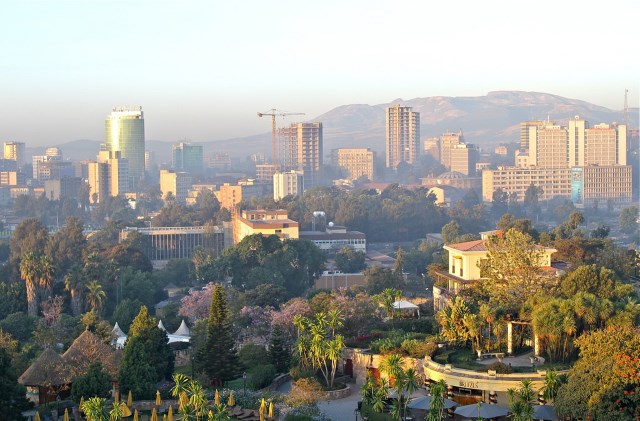
A fundraising effort aimed at beautifying the Ethiopian capital, Addis Ababa, has raked in over $25 million from a section of the project supporters.
PM Abiy Ahmed’s office disclosed on Monday 12 May that the latest amount of funds had been raised from local and international support including from the Italian government which contributed 5,000,000 Euros.
Two United Nations outfits gave a million dollars each while the African Development Bank, AfDB, gave 600,000 dollars. The largest tranche of over 17 million dollars were deposits at the Commercial Bank of Ethiopia.
The project mainly aims to lift the image and potential of the capital. With the goal of creating many jobs in the project phase, it also aims to generate riverside economies, increase urban tourism, and provide the city’s residents with areas of respite.
The funds paid towards the ‘Beautifying Sherger Project,’ will culminate in a dinner event ‘Dine for Sherger,’ slated for later this week. A seat at the event is valued at 5 million birr. Among others, donors get a plaque with their names along the project route and a photo opportunity with the PM.
Abiy’s office has over the last few months published four rounds of depositors for the dinner. Mostly state-run outfits and businesses operating in the country had been listed as well as several individuals.
The Addis Ababa Riverside Project is a three-year initiative of the Prime Minister of the Federal Democratic Republic of Ethiopia, H.E. Abiy Ahmed Ali.
The development project will run along the two biggest rivers in Addis Ababa – stretching 23.8kms and 27.5kms respectively – all the way from the mountains of Entoto through to Akaki river.
“The project essentially aims to lift the image and potential of the capital. With the goal of creating many jobs in the project phase, it also aims to create riverside economies, increase urban tourism, and provide the city’s residents with areas of respite,” his official social media pages said.
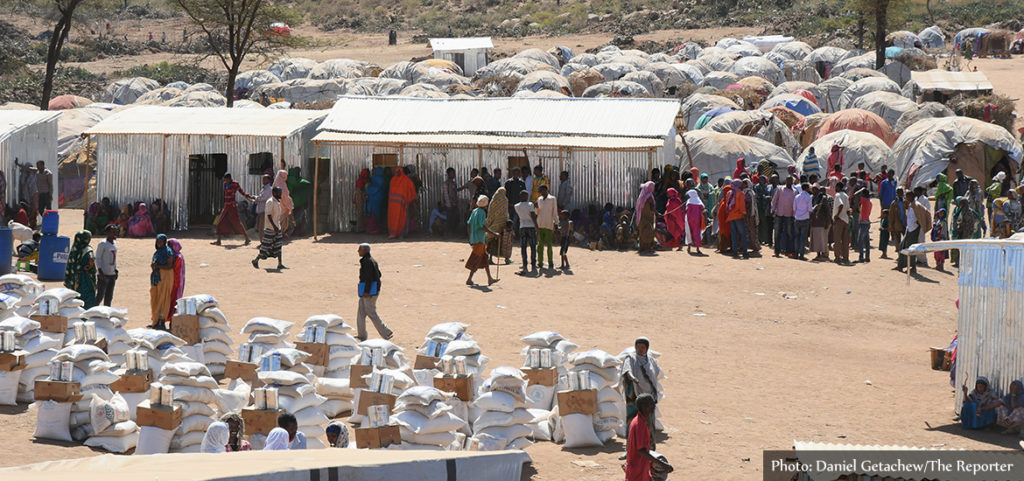
The Ethiopian government disclosed on May 16 that some 45 camps that have been hosting Internally Displaced People (IDP) were closed as part of the ongoing national repatriation efforts.
The recently terminated 45 IDP camps had been housing more than 66,000 ethnic-conflict affected people, who left their homes following a recent ethnic conflict along the border of Ethiopia’s largest Oromia region and Benishangul Gumuz region.
Last week, the Ethiopian government disclosed the voluntary return of some 870,000 IDPs to their areas of origin in different parts of the East African country.
The nationwide repatriation efforts began last month as part of a strategic plan that aimed to address internal displacement across the country.
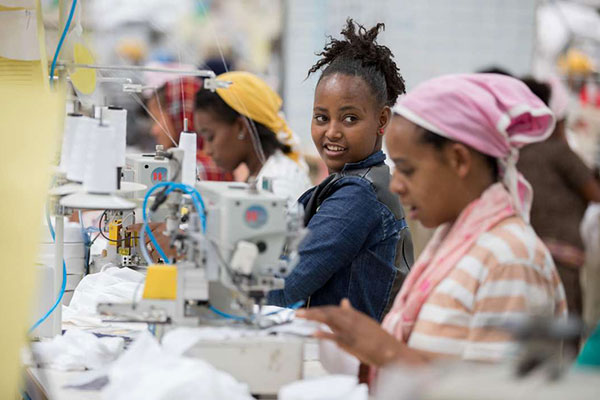
During the first nine months of Ethiopian calendar started July 8, 2018, Ethiopia has attracted foreign direct investment of $1.83 billion.
The investments were made by 152 new foreign companies, according to the Ethiopian Investment Commission. The sources of the foreign direct investments to Ethiopia include China, Indonesia, Malaysia, Hong Kong, Saudi Arabia, Sri Lanka, Korea, Egypt, Sudan, and Norway. The investment areas range from sugarcane to rubber plantations and processing to manufacturing of mobile phones, cable, metal, and real estates and LPG, among others.
The nine months performance report of the Ethiopian Investment Commission (EIC) was presented to the parliament by Commissioner Abebebe Abebayehu. The plan of the Commission for the period was to attract $2.6 billion foreign direct investment. Among the new investments is Shanghai Mofeng Import and Export Trade Co. Ltd of China, which aims to invest $10 million in electronics industrial park. ZHEN ZHEN OBS OPTO- ELECTRONICS CO. LTD of China is also registered to invest $2.5 million in production of LED (light-emitting diode, a semiconductor light source that emits light production.
The nine months performance report of the EIC also shows that Zhonglong Integrated Textile and Wearing Manufacturing plc of China is registered to invest $28 million in textiles. FIT Holdings of Hong Kong is also registered to invest $10 million in the manufacturing of mobile phones and other materials usable at the household level.
Suren Madayalee All cable Plc of Srilanka is also registered to invest $10 million in metals and steel production. A joint venture of an Indonesian and a Malaysian company, Indo foods, Pinehilu Akabia Foods limiting, is registered to invest $50 million in rubber tree and sugar plantations.
A joint venture between and Ethiopian and Saudi Arabian nationals registered as, Mohamed Nur, has also taken investment license to invest $100 million in real estate and Liquefied Petroleum Gas (LPG). Saudi pipe systems Co. of Saudi is also registered to invest $5 million in production of pipes.
Lava of Egypt is also set to invest $5 million in mobile manufacturing in Ethiopia, while Sudan’s Bash Pharma Co. Ltd, is also registered to invest $5 million in production of medicines. JOTUN from Norway is also registered to invest $3 million in fabricated metals while HANSHIN Electric Wire and Cable Co. Ltd of Korea has got a license to invest one million dollars in manufacturing of cables.
The report also shows that a joint venture by Yemeni and Ethiopian investors, Saba confectionary, is also in the process of investing $2.5 million in sweets manufacturing in Ethiopia.

Seven political parties, including Patriotic Ginbot 7, have formed a new party after they dissolved themselves.
The other parties are Ethiopian Democratic Party (EDP), All Ethiopian Democratic Party (AEDP), Semayawi Party, New Generation Party (NGP), Gambella Regional Movement (GRM) and Unity for Democracy and Justice (UDJ) party.
In today’s session, they formed a new party named ‘Ethiopian Citizens for Social Justice’ as well as approved a logo of the party.
They are expected to elect a chairperson and deputy chairperson as well as general secretary of the new party today.
In his opening remark, Andargachew Tsige, General Secretary of Patriotic Ginbot 7, said: “the new party has an objective to realize a country that is favorable for all Ethiopian citizens.”
A new chapter has been opened in Ethiopia, he said, adding “we all are responsible to maintain the momentum of this change.”
According to him, engagement in peaceful struggle and citizen-based politics is a preferable path for Ethiopia.
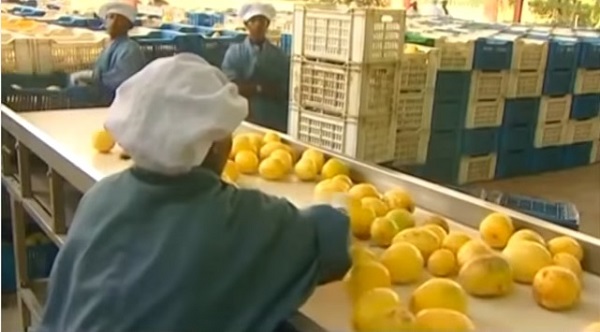
Ethiopia has reported a 9.6 percent average economic growth over the past three years. In a communique it issued on Thursday, May 9, the Ethiopian Peoples’ Revolutionary Front (EPRDF) said the average GDP registered during the period was 9.6 percent, with 5.7 percent growth in agriculture, 19.1 in industry and 10.3 percent in the services.
The average GDP growth over the past three years has declined from 10.1 percent in the previous yeas to 9.6 percent over the past three years, it noted.
The Executive Committee has passed resolutions that will help boost the country’s economy, following extensive discussion about the economy of the country.
Instability and the low FDI flow into the country were blamed as major factors for the cooling of the economy, even though the growth one of the highest in Africa.
It further noted that the effort to limit inflation into a single digit by creating stable macro-economy was not successful in the stated years. Consequently, inflation reached 13.1 percent at the end of the Ethiopian fiscal year which ended on July 8, 2018.
In general, the loan-based financial development model the government has been pursuing and low capacity of the management of huge state-owned projects created problems for the economy.
The committee hoped that the bilateral and multilateral relations which the government has been building in the past one year helped the nation to improve the influence and acceptance at the global level which it said will contribute to addressing economic challenges into exploring opportunities.
The ruling EPRDF indicated that enhanced engagement of the Ethiopian Diaspora and participation of the public in political and developmental spheres has also created opportunity in re-invigorating the economy.
The government has imposed limits on loan to meet budget deficit not to exceed 3 percent of the economy and ensure macroeconomic stability by restricting government spending and boosting tax income.
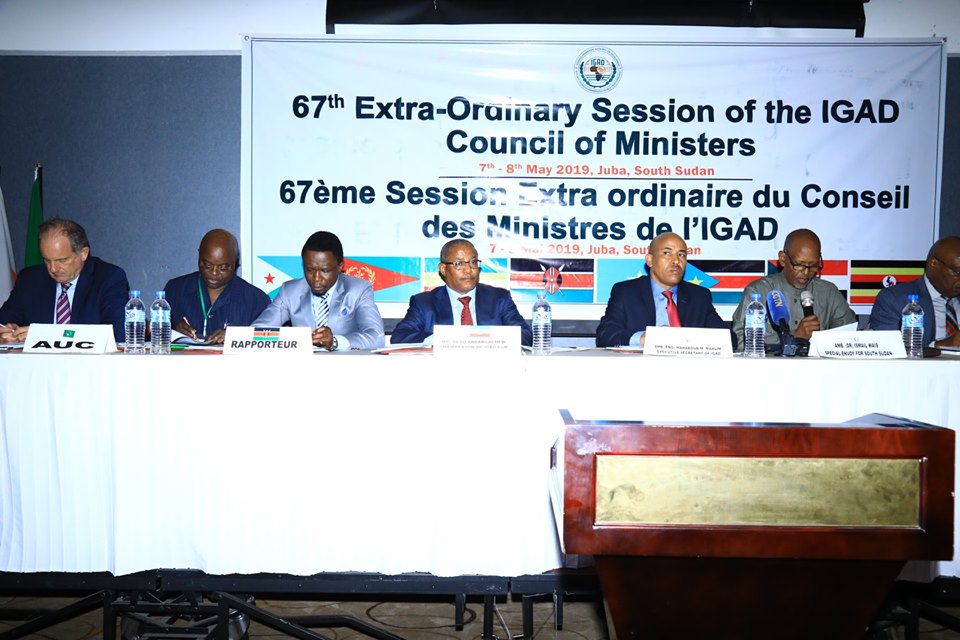
Foreign Minister of the Federal Democratic Republic of Ethiopia and Chairperson of the IGAD Council of Ministers, H.E. Gedu Andargachew chaired the 67th Extraordinary Session of Council of Ministers, which opened in Juba, South Sudan on May 7.
The meeting aimed at taking stock of the progress made in the implementation of the Revitalized Peace Agreement and the challenges encountered in meeting some of the key timelines and benchmarks.
Thanking his colleague Ministers for their congratulatory messages and best wishes on his new appointment as Foreign Minister, H.E. Gedu Andargachew recalled the meeting of the parties to the Revitalized Agreement under the auspices of IGAD, which was held in Addis Ababa last week to review the status of implementation of the pre-transitional tasks, identify key challenges.
He commended the parties for their commitment to reach at consensus in extending the pre-transitional period for six months to allow for the full implementation of critical pending tasks. In connection, the Minister noted the importance of developing a clear roadmap and implementation schedules for the pending tasks.
Acknowledging the challenge related to finance, Minister Gedu commended the Transitional Government of National Unity for its pledges to commit 100 million US dollars to expedite the implementation of the pending tasks, which he said, would encourage regional and international partners to provide support to this process.
Despite the challenges and delays in meeting some of the timelines and benchmarks, Foreign Minister Gedu said progress has been made since the signing of the revitalized peace agreement, including the establishment and reconstitution of the necessary Agreement institutions and implementation mechanisms for the Pre-Transitional Period as well as improvements in the implementation of the Permanent Ceasefire. “I hope at the end of our meeting, we will be able to agree on the right course of action to help the process move forward,” he added.
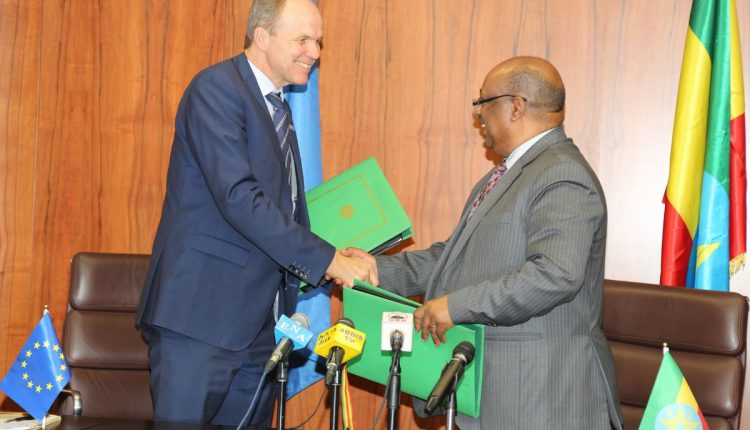
The Government of Ethiopia and the European Union (EU) have signed a financing agreement amounting to 33.5 million Euros for the EU-TRUST Fund for Disaster Risk Reduction project.
The agreement was signed here today by Admasu Nebebe, Ethiopia’s State Minister of Finance and Mr. Erik Habers, Head of Cooperation of the European Delegation to Ethiopia, according to a press release issued by the Ministry.
The Disaster Risk Reduction project will focus on strengthening households, communities and local authorities to manage and adapt to disasters and other risks, thus reducing their humanitarian and economic impact, including forced displacement and irregular migration.
According to the Ministry, the project will be implemented in 54 months (2019-2023) by NGOs, National Disaster Risk Reduction Management Agency in Somali, SNNP, Oromia and Amhara regional states.
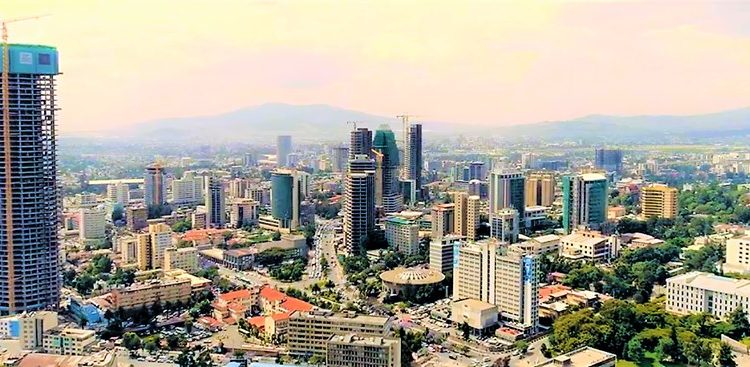
The Addis Ababa city administration has announced a plan to create employment opportunities for more than 161, 000 unemployed youth.
According data from the Central Statistics Agency, more than 10 million people are currently unemployed in Ethiopia, including 406,000 in the capital Addis Ababa. And 200,000 of them are youth.
The Addis Ababa city administration had allocated 2 billion birr revolving fund for job creation activities.
Jemalu Jember, job creation and enterprises development bureau head of the administration, told FBC that preparations have been finalized to use the fund for the intended purposes.
He said amendment was made on the distribution of loan to increase the number of beneficiaries of the revolving fund.
According to him, an individual can get access to loan service without age limit if his/her business idea is proved feasible and labor intensive.
Amendments were also made on the amount an individual is required to save in order to get access to loan as well as on the repayment of loans and grace period, he added.